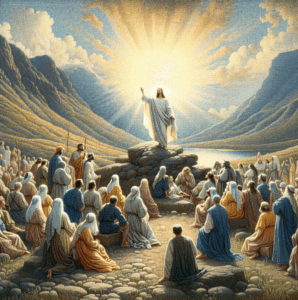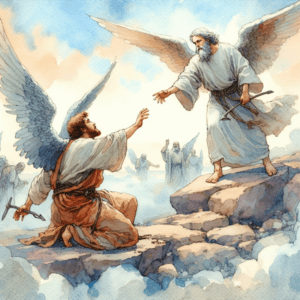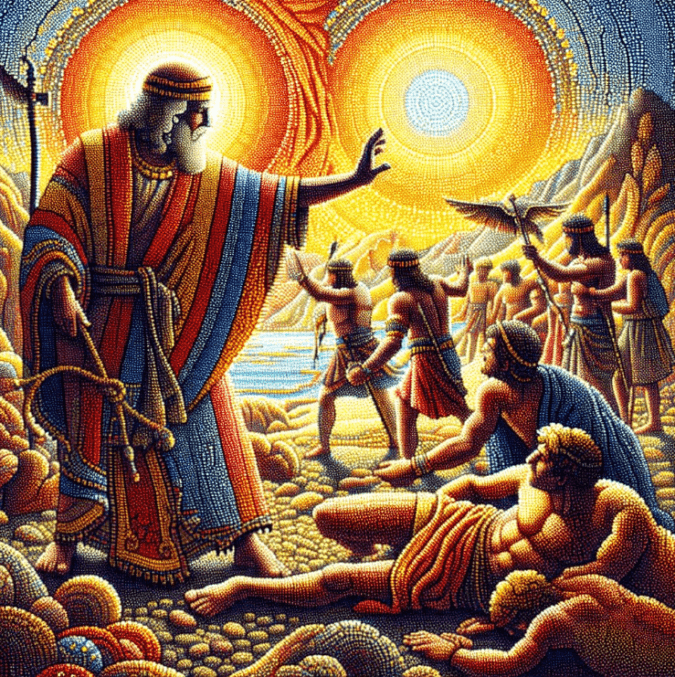GOD RESTRAINS ABRAHAM
James wrote that Abraham was justified by works when he offered up his son. But wait just a minute.
Did Abraham offer his son?
Does your Bible say that Abraham plunged the knife into his son?
No, and mine doesn’t read that way either. After building the altar, Abraham binds Isaac and lays him on it. Before he can kill his son, though, the Lord’s voice rings out from heaven commanding Abraham not to harm Isaac.
The test is over. Abraham has passed: “‘…now I know that you fear God, seeing you have not withheld your son, your only son, from me'” (Genesis 22:12).
Genesis 22:11-14 KJV
[11] And the angel of the LORD called unto him out of heaven, and said, Abraham, Abraham: and he said, Here am I.
[12] And he said, Lay not thine hand upon the lad, neither do thou any thing unto him: for now I know that thou fearest God, seeing thou hast not withheld thy son, thine only son from me.
[13] And Abraham lifted up his eyes, and looked, and behold behind him a ram caught in a thicket by his horns: and Abraham went and took the ram, and offered him up for a burnt offering in the stead of his son.
[14] And Abraham called the name of that place Jehovah–jireh: as it is said to this day, In the mount of the LORD it shall be seen.
Genesis 22:11 KJV
And the angel of the LORD called unto him out of heaven, and said, Abraham, Abraham: and he said, Here am I.
 It was not God’s intention that Isaac should actually be sacrificed, yet nobler blood than that of animals, in due time, was to be shed for sin, even the blood of the only begotten Son of God.
It was not God’s intention that Isaac should actually be sacrificed, yet nobler blood than that of animals, in due time, was to be shed for sin, even the blood of the only begotten Son of God.
In the instant before this verse, Abraham was poised to kill his beloved son, Isaac (Genesis 22:9–10). This was in obedience to a command given directly from God. Of course, this would have seemed as unthinkable to Abraham as it does to us.
Abraham’s obedience comes as a result of his trust in God. Abraham has seen, first-hand, how God can prove His righteousness, even when limited people cannot understand what is happening.
Abraham is not blindly obeying for no reason. He is acting for the best possible reason: because he has experienced God’s goodness enough to trust Him!
The repetition of Abraham’s name and the cry of the voice from heaven indicates the urgency of the moment. Abraham responds as he did when God first spoke to him in verse 1, and as he did when Isaac asked him about the lamb: “Here I am.”
Once more, none of Abraham’s emotion is revealed to us. He appears to be ready to do next whatever the Lord asks of him. He was certainly prepared to commit the act God had asked of him, right up until the moment he is stopped by this voice.
Genesis 22:12 KJV
And he said, Lay not thine hand upon the lad, neither do thou any thing unto him: for now I know that thou fearest God, seeing thou hast not withheld thy son, thine only son from me.
 But in the mean while God would not in any case have human sacrifices used. Reference must be had to the promised Messiah, the blessed Seed.
But in the mean while God would not in any case have human sacrifices used. Reference must be had to the promised Messiah, the blessed Seed.
In complete and unhesitating obedience to God, Abraham was preparing to kill Isaac as he lay tied up on an altar. Knife in hand, Abraham is stopped by an urgent voice from heaven calling out his name.
Now the angel of the Lord makes it clear: Don’t hurt the boy in any way. This was God’s plan all along, and Abraham has passed God’s test of his faith.
The angel of the Lord, truly the Lord in another form, goes on: Now I know that you fear God since you have not withheld your only son from me.
In the Old Testament, especially, to “fear God” means to have such great respect and reverence for the Lord’s power and righteousness that you obey Him above all others.
God’s test satisfied the question of whether Abraham “feared” God once and for all. Abraham’s faith, we should note, is not ignorant or blind. Instead, he is choosing to trust God as a result of prior experiences.
Time and again, God has proven that Abraham does not need to understand every detail, he merely needs to obey. God will work to prove His own righteousness in the end. Here, again, this is proven to be the case, though in a far more direct and dramatic form.
The Lord again refers to Isaac as “your son, your only son.” We must not miss the parallel to John 3:16: “For God so loved the world, that he gave his only Son, that whoever believes in him should not perish but have eternal life.”
Genesis 22:13 KJV
And Abraham lifted up his eyes, and looked, and behold behind him a ram caught in a thicket by his horns: and Abraham went and took the ram, and offered him up for a burnt offering in the stead of his son.
 Another sacrifice is provided. Christ was sacrificed in our stead, as this ram instead of Isaac, and his death was our discharge. Earlier in Genesis 22, Isaac had asked his father where the lamb was that they were to sacrifice.
Another sacrifice is provided. Christ was sacrificed in our stead, as this ram instead of Isaac, and his death was our discharge. Earlier in Genesis 22, Isaac had asked his father where the lamb was that they were to sacrifice.
Abraham replied that the God would provide for Himself the lamb (Genesis 22:8). Whether Abraham understood that God had provided for Himself Isaac or that another lamb would be provided, we don’t know.
In either case, God does exactly as Abraham said He would. The lamb, a ram, was presented ready-made to Abraham for the sacrifice. It was caught in a thicket right behind him. Abraham had only to replace Isaac with the ram and continue the offering.
The ram given by God served as the substitute for Isaac in Abraham’s burnt offering. Again, we’re told nothing of the emotions or words of Abraham or Isaac in response to all of this.
What matters most to the Lord is made quite clear: their actions (James 2:20–22). Whatever he was feeling or thinking, Abraham trusted God and obeyed. He had passed the test, and the Lord had provided another offering as a way of worshipping God.
The call from heaven not to kill Isaac (Genesis 22:12), and the provision of a substitute sacrifice, serve to prove that Abraham’s trust in God was well-placed.
Just as He had in the past, God demonstrated that He was willing and able to keep His promises, and display His righteousness, even when limited human beings could not understand what was happening.
Genesis 22:14 KJV
And Abraham called the name of that place Jehovah–jireh: as it is said to this day, In the mount of the LORD it shall be seen.
 And observe, that the temple, the place of sacrifice, was afterwards built upon this same mount Moriah; and Calvary, where Christ was crucified, was near.
And observe, that the temple, the place of sacrifice, was afterwards built upon this same mount Moriah; and Calvary, where Christ was crucified, was near.
A new name was given to that place, for the encouragement of all believers, to the end of the world, cheerfully to trust in God, and obey Him.
Jehovah-jireh, the Lord will provide; probably alluding to what Abraham had said, God will provide himself a lamb. The Lord will always have his eye upon his people, in their straits and distresses, that he may give them seasonable help.
Abraham has just passed an enormously difficult test of his trust in God. Abraham obeyed God’s seemingly cruel command to sacrifice his son, Isaac (Genesis 22:1–2), up to the moment where God intervenes to prevent the act from happening (Genesis 22:11–12).
After commanding Abraham not to sacrifice his only son, the Lord provided a substitute sacrifice, a ram. (Genesis 22:13) Abraham commemorated the place by naming the mountain. He called it “The Lord will provide.”
The phrase “to this day,” is a reference to the writing of the book of Genesis. So, at least until that point, the name given to the mountain by Abraham stuck. It was the mountain of “The LORD will provide.”
It became a saying, apparently: “On the mountain of the LORD, it will be provided.” It was not unusual in Genesis for a name to be changed in order to mark a significant event or interaction with the Lord.
Beersheba had been named for the oath that included Abraham’s well (Genesis 21:31). Bela had been renamed Zoar when Lot and his daughters took refuge from God’s judgment there (Genesis 19:22).
And Abraham and Sarah both had been renamed by God on the day He revealed to Abraham that Isaac would soon be born (Genesis 17:5; 17:15).
I hope that you have really enjoyed this post,
Please Leave All Comments in the Comment Box Below ↓













This article piqued my interest due to its profound exploration of religious themes.
Raised within a devout milieu, I encountered scriptures at a young age but lacked the maturity to grasp their significance. However, this piece has illuminated the concept of “Fear God” for me, elucidating its potential to fortify one’s faith amidst life’s challenges.
It underscores the importance of persevering in faith, even when confronted with adversity, and emphasizes the value of trusting in divine guidance, even when the path ahead seems uncertain.
Indeed, it encourages a perspective that focuses not on comprehending the entirety of life’s journey but on steadfastly taking each step forward in faith. Truly compelling insights.
Thank you for sharing this.
Hello Etana,
Thanks for stopping by and commenting on GOD Restrains Abraham – Provide Another Sacrifice. You are more than welcome to use this platform to assist in your personal Holy Bible Study.
Thank you for your time. Your comments are greatly appreciated.
Blessings My Friend!
This reflection on the story of Abraham and Isaac offers a profound insight into the nature of trust and obedience in the face of seemingly impossible challenges.
It’s a reminder of the depth of Abraham’s faith and the reassurance that God always provides, even in the most testing of times.
Thank you for sharing this perspective on such a significant biblical narrative.
Hello Amanda,
Welcome to the HBS & DwJ platform. It is a pleasure to learn that you feel this reflection offers a profound insight into the nature of trust and obedience in the face of seemingly impossible challenges. I definitely agree that it’s a reminder of the depth of Abraham’s faith and the reassurance that God always provides.
Come back again,
Blessings My Friend!
Beautiful story!
The bible is all about interpretation. I love the way you explained this instance in the bible. I am not the most knowledgeable person when it comes to every aspect of the bible, but I am growing closer in my faith, and this has really helped me.
Thank you:)
Hello Allie,
Thank you so much for your comment on GOD Restrains Abraham – Provide Another Sacrifice, it is definitely appreciated. It is great to know that this HBS & DwJ has really helped you in growing closer in your faith, that is exactly what this platform is designed for.
Looking forward to hearing from you soon.
Blessings My Friend!
Thank you for your dedication to spreading the word of God, I have read the story so many times but typical of God’s word, you always find something new to learn or a portion will reflect in clearer light.
The lesson I get from the story of Abraham is that we must wholly trust God’s wisdom without questioning, He is too wise to err and too good to do us any harm. I also admire how he raised his son, who could have ran away and Abraham could not have caught up with him, but he willingly consented and gave himself up to be sacrificed, making him a shadow of Christ.
I can go on and on lol, thank you once again for sharing.
Hello Elias,
You are welcome for my dedication to spreading the Word of GOD.
Thank you for stopping by and commenting on GOD Restrains Abraham – Provide Another Sacrifice. I definitely agree, that there is always something new to learn or a portion of study that will reflect in a clearer light, the more we study biblical scriptures. Your comment was well stated.
Thank you again for your time,
Blessings My Friend!
This blog article provides an insightful examination of Abraham’s near-sacrifice of Isaac, a foundational narrative in the Bible.
It’s fascinating how the story is dissected to emphasize Abraham’s unwavering faith and trust in God. The article explains the fact that Abraham did not ultimately sacrifice Isaac. Instead, his willingness to obey God up to that critical moment was what truly mattered. This highlights a profound lesson about faith, not just blind obedience, but a trust based on prior experiences of God’s faithfulness and goodness.
Overall, this article does a great job in making the profound lessons of this biblical story accessible and relatable. It’s a thoughtful reminder of the importance of faith, obedience, and the assurance of God’s provision.
Hello Kavitha,
Welcome to the HBS & DwJ platform.
You have a fantastic insight on GOD Restrains Abraham – Provide Another Sacrifice. I really appreciate your perspective on how this article provides an insightful examination of Abraham’s near-sacrifice of Isaac, a foundational narrative in the Bible.
Thank you so much! Your comment means a lot to the HBS & DwJ platform. Please visit us again.
Blessings My Friend!